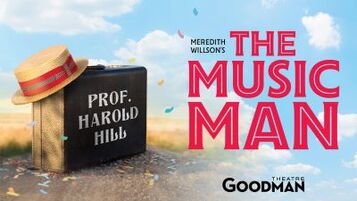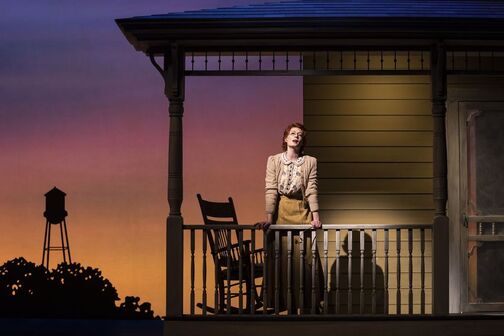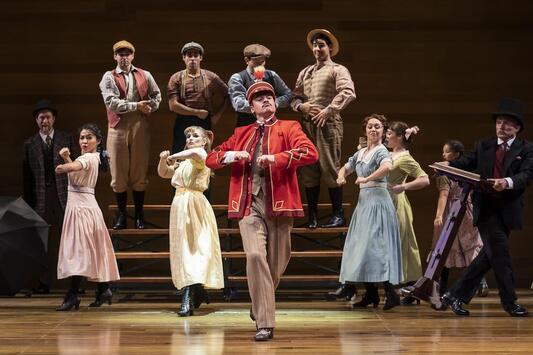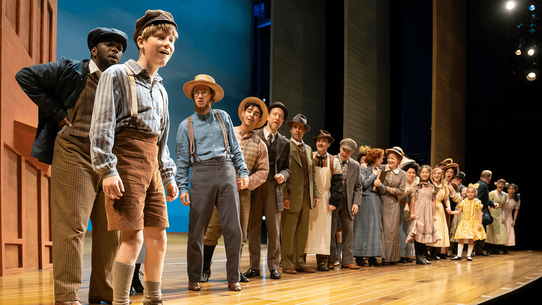|
When I went to Chicago the other week, it was for my regular mid-year trip there. But I timed it specifically so that I could get a ticket for a production of Meredith Willson's The Music Man (to give its full and correct title under the circumstances...) that the acclaimed Goodman Theatre -- a Tony-winner for Best Regional Theatre -- was doing, moreover directed by Marry Zimmerman who is an Artistic Associate of the Goodman, as well as a professor at Northwestern University -- and herself won a Tony Award for directing in 2002. I was really interested in what they -- and especially she -- would do with the show. To put this in proper perspective, I not only love The Music Man, which is one of my top-favorite shows, but it was the first professional musical I ever saw when I was a real little kid, performed at the Shubert Theater in downtown Chicago. It enthralled me then, and has continued to. I wouldn't precisely call myself an aficionado of the show, but the details matter to me. (Among the productions of the show I've seen include a memorable one in Los Angeles around 1980 that starred Dick Van Dyke as Prof. Harold Hill. I wrote about it here, and embedded a video of him performing the song, "Marian the Librarian.") So, as much as the trip was about going to Chicago, the timing was entirely about The Music Man. Overall, I thoroughly enjoyed it. The style was quite different from most productions. Rather than treating the people of River City and the world of the show as archetypes, Zimmerman played it all quite low-key and realistic. And the staging and set design were almost bare bones, with the production looking somewhat like a painting by Winslow Homer or Grant Wood (the artist of "American Gothic," which is actually written into the number "Iowa Stubborn" as a joke).. It was very effective and added great charm and believability to the show. This realistic quality, in turn, impacted the role of Harold Hill, played by Geoff Packard. There are largely two main ways to play the con man Professor. One, as performed in the original Broadway production and movie by Robert Preston, is as an out-of-town big city hustler who's come in to steamroll over the small town hicks, and the other is to slyly and deceptively "aw-shucks" ingratiate himself into the town as a good-old-boy one of them. (This is the interpretation Dick Van Dyke took, as did Matthew Broderick in the TV movie remake.) I personally prefer the former, because the startk contrast of a fast-talking Hill to the bucolic townspeople is dramatically more effective to me. Surprisingly, Zimmerman and Packard had an uncommon third way, one that fit the overall low-key realism of the production. And that's to play Prof. Hill pretty straightforward and present him unapologetically for who he is -- an out-of-town traveling salesman who very openly wants to sell something that no one has expressed any interest in. It was very intriguing and works quite well in many ways being thoroughly believable -- Packard most definitely does a good job -- though for my taste I think in the end it's not the right way to go. When Harold Hill is played as a big city hustler, tries to overwhelm people with exuding charm. When being slyly ingratiating, he wins over people with his presumed close kinship. But a traveling salesman selling what you don't need, while fun, isn't overly likable. And while that works okay for him being able to ultimately sell band uniforms and instruments to a town that becomes convinced by his bamboozling that they need them, it's doesn't work as well when believing that Marian the Librarian will fall in love with him. We accept that they fall in love because not only does the great structure of the show push us there effusively, but also because we see how moved she is that Prof. Hill has brought her shy, silent little brother Winthrop out of his shell. So, it works -- but for my taste it doesn't work on every level, because "appreciation" and "admiration" are not the same as love. That said, the performances were generally extremely good. Those who stood out for me were Monica West as a terrific Marian Paroo, in a rich, lovely performance (seen below). Mary Ernster was a wonderful Widow Paroo, her mother. And Ron E. Rains did a particularly nice job as the blustery Major Shinn. On a personal level, I also enjoyed seeing Heidi Kettenring chewing up the scenery as the Mayor's wife, Eulalie Mackecknie Shinn (at times a bit much, but it was fun and fit well) -- particularly since I'd seen her eight years ago in a much-more understated and wonderful performance of Harnick and Bock's She Loves Me at the Writers Theatre in Glencoe, a production that starred Jessie Mueller who soon after went on to win a Tony Award as Carole King in Beautiful. As I said, overall, I thought the production was fresh, unique and very good. My only real quibbles (beyond how the more realistic style affected the character of Harold Hill) center around two specific directorial choices. There are perhaps two especially-famous moments of High Musical Theater Drama in the show. The first is when Harold Hill jumps into the town's Fourth of July rehearsal to convince them all that what they most need is a band that would be filled with "76 Trombones." And the sequence begins with one particular, dramatic flourish where he brazenly dazzles the staid townfolk by suddenly changing himself -- from an out-of-towner into a mesmerizing bandleader -- and he inverts his very-ordinary sportcoat inside-out which immediately becomes a flashy, bandleader's uniform and punches out the top of his straw hat, turning it into a plumed bandleader's cap. Here, though, seemingly to be more realistic is my guess, he didn't do that. He simply had his friend Marcellus open his suitcase, take out a coat and give it to him. And then picked up a splashy hat. It was realistic, but it wasn't especially interesting, and wouldn't have galvanized anyone in the gym to follow this,"snake oil salesman," as Mayor Shin calls him. He doesn't magically transform himself. He put on a coat and hat. The other is one of the famous High Dramatic moments in musical theater, in a league with when Eliza Doolittle first is able to speak English properly and slowly ekes out the phrase, "The rain in Spain...stays mainly...in the plain" from My Fair Lady. It comes in The Music Man when little Winthrop, whose lisp and loss of his father has made him near-totally withdrawn and silent, suddenly BURSTS through the entire town, runs to centerstage down by the footlights, and all alone in the spotlight, for maybe the first time in his life, sings with utter, explosive joy about the Wells Fargo Wagon that's about to come to town might actually have "thumthin' thpecial" just for him!! It's a galvanizing moment in the show (and musical history), which helps cause Marian to fall in love with Harold, as her little brother races over to her afterwards to embrace one another. Here, though, to be more realistic, he's far off to the side, waiting with everyone for the wagon to arrive, and just takes a steps forward -- stage right, amid the crowd -- to sing his song. It's a nice moment -- there's no way it can't be -- and realistic and believable, but I don't think it sends the bolt of excitement through the audience which made the moment a classic. He's happy. But it's not "thumpthin' thpecial." I missed those big, and I think important moments. I also missed having a bit more of the attraction between Harold and Marian that builds their romance. But...I loved the realism of the production, the overwhelming charm that that brought, the excellent performances and the general joy of such a terrific show. It worked very well. And I'm pleased to know that the audience loved it enough for the Goodman Theatre to extend the run. Here's a good behind-the-scenes look at the show with director Mary Zimmerman and the two leads, along with a bit of "76 Trombones." And here is a very abbreviated version (which they clearly trimmed themselves to fit their two minutes on TV) of "Trouble" performed by the cast on a daytime syndicated show, Windy City Live.
0 Comments
Leave a Reply. |
AuthorRobert J. Elisberg is a political commentator, screenwriter, novelist, tech writer and also some other things that I just tend to keep forgetting. Feedspot Badge of Honor
Archives
June 2024
Categories
All
|
|
© Copyright Robert J. Elisberg 2024
|










 RSS Feed
RSS Feed